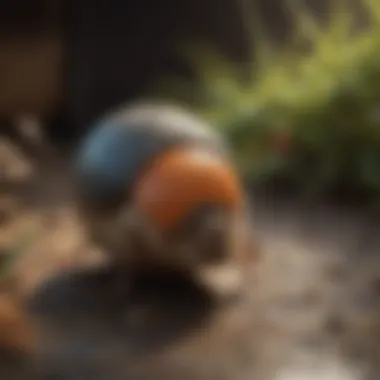Pest Control Strategies in Egg Harbor Township NJ


Intro
Pest control represents a crucial concern for households in Egg Harbor Township, NJ. The area's unique climate and environment foster diverse pest populations. Awareness and understanding of these pests are essential for effective management strategies that prioritize sustainability.
The difficulty in managing these nuisances lies primarily in their ability to adapt and thrive. Recognizing the common pests and their behaviors can significantly enhance the effectiveness of pest control efforts. Additionally, professionals and homeowners alike can benefit from embracing eco-friendly methods that minimize chemical use while still ensuring a pest-free environment.
In this guide, we will explore various facets of pest control in Egg Harbor Township, from identification to prevention measures and control methods. This comprehensive approach will provide valuable insights into both immediate and long-term pest management strategies.
Understanding the Pest
Identification
Identifying pests accurately is the first step in any effective pest control strategy. Common pests in Egg Harbor Township include ants, spiders, bed bugs, cockroaches, and rodents. Each type of pest has distinct physical characteristics and behaviors that can aid in identification:
- Ants: Often found in trails, varying in size and color. For instance, the carpenter ant is large and black, while the sugar ant is smaller and brown.
- Spiders: Commonly found in corners or hidden areas. The brown recluse and black widow are two notable species in the region.
- Bed Bugs: Small, brownish insects, often found in bedding and furniture. Their bites can cause discomfort and allergic reactions.
- Cockroaches: Typically dark brown to black, usually seen in kitchens and bathrooms, known for their resilience.
- Rodents: Mice and rats can cause significant damage. Their droppings, gnaw marks, and nesting materials are key indicators of their presence.
Life Cycle
Understanding the life cycles of pests is vital for effective intervention. For instance, ants have various stages: egg, larva, pupa, and adult. Generally, faster reproduction rates can escalate infestations quickly. Here’s a brief overview of typical life cycles:
- Ants: A queen can produce thousands of eggs annually, leading to rapid colony growth.
- Bed Bugs: Their life cycle includes an egg, five nymph stages, and adult. They can reproduce every 3-4 weeks under favorable conditions.
- Cockroaches: They produce egg cases that contain multiple embryos, thus contributing to rapid population increases.
By understanding these cycles, powerful prevention measures can be developed.
Pest Prevention Strategies
Environment Modification
To deter pests, modify the environment to make it less hospitable. This includes:
- Removing standing water and fixing leaks to prevent breeding grounds for mosquitoes.
- Keeping food sealed and stored properly to avoid attracting rodents and ants.
- Maintaining cleanliness, especially in kitchens, to minimize potential food sources for pests.
Physical Barriers
Physical barriers serve as a practical first line of defense. Consider the following measures:
- Sealing cracks and crevices around doors and windows to prevent entrance.
- Installing screens on windows and vents helps keep flying insects out.
- Using traps that physically capture pests without chemicals, making them safer for residential use.
Control Methods
Chemical Control
Chemical control should be utilized judiciously. When opting for chemical solutions, consider formulations that prioritize safety. Focus on:
- Integrated Pest Management (IPM): A balanced approach involving monitoring, prevention, and targeted treatments minimizes unnecessary chemical use.
- Baiting systems: Used for specific pests like ants and cockroaches, these systems target the pest directly.
Biological Control
Biological control uses natural predators to manage pest populations. Examples include:
- Beneficial insects: Ladybugs and lacewings can help control aphids and other soft-bodied pests.
- Nematodes: This microscopic roundworm can target various soil-dwelling pests.
Leveraging natural solutions enhances sustainability efforts in pest management.
By integrating these approaches into an overall pest management plan, households in Egg Harbor Township can effectively tackle pest problems while promoting an eco-friendly environment.
Prolusion to Pest Control
Pest control is an essential component of maintaining a healthy environment in both residential and commercial spaces. It is not merely about eliminating insects or rodents; it encompasses a comprehensive approach to managing pest populations effectively. Understanding the significance of pest management in Egg Harbor Township is crucial. This knowledge aids residents in identifying threats posed by common pests, determining effective methods of control, and making informed decisions regarding their living or working spaces.
Understanding the Importance of Pest Management
The ramifications of an unchecked pest problem can be extensive. Many pests carry diseases, contaminate food, and can damage property. For instance, rodents like mice and rats can transmit illnesses such as hantavirus or leptospirosis. Termites, on the other hand, can quietly cause structural damage to homes, often going unnoticed until significant harm has been done. Therefore, effective pest management is not just about fighting a problem that is already present; it is also about prevention and education.


Moreover, employing efficient pest control strategies can save both time and money in the long run. By addressing pest issues proactively, homeowners can avoid costly repairs and potential health complications. Integrated Pest Management (IPM) techniques promote a balanced approach, reducing reliance on chemical treatments and fostering safer environments for families, pets, and the local ecosystem.
Overview of Pest Control in Egg Harbor Township
Egg Harbor Township, located in New Jersey, faces a diverse array of pest challenges, influenced by its unique environment. The region's climate and vegetation create suitable conditions for various pests to thrive. Ants, rodents, and stinging insects are among the most prevalent issues that residents encounter.
In this township, pest control strategies differ depending on the pest and the circumstances. Many local pest control services focus on eco-friendly approaches, aligning with the growing demand for sustainable practices. Residents are encouraged not only to seek professional assistance but also to engage in preventative measures. Recognizing the signs of pest infestations early and implementing maintenance routines can significantly reduce the likelihood of severe infestations.
"Effective pest control begins with an awareness of the local pest landscape and a commitment to sustainable practices."
Common Pests in Egg Harbor Township
Understanding the common pests in Egg Harbor Township is crucial for effective pest management. Knowing which pests are abundant in the area allows homeowners to take appropriate measures early. This knowledge can prevent infestations from occurring and minimize damage. Additionally, recognizing the behaviors and habitats of these pests is key. It helps to tailor solutions that are both effective and sustainable. Let's delve into the specific pests that residents may encounter.
Identifying Local Pests
Knowing the local pests can simplify the control process. Various species are likely to invade homes, and familiarity with them helps in taking proactive measures.
Rodents
Rodents, particularly mice and rats, are very common pests in Egg Harbor Township. They are known for their rapid reproduction rates and adaptability to various environments. These pests pose health risks by contaminating food and spreading diseases. Their capability to squeeze through small openings makes them especially troublesome. Managing rodent populations is essential for maintaining a safe and healthy home environment.
Termites
Termites are notorious for damaging wooden structures. They thrive in warm, moist conditions, which can be prevalent in Egg Harbor Township due to its climate. Their ability to eat through wood silently makes them particularly damaging before detection. Preventing termite infestations involves regular inspections and prompt repairs of any wood damage found in the home. Early detection can save homeowners from costly repairs.
Ants
Ants can invade homes in search of food and nesting sites. Some species, like carpenter ants, can also cause structural damage. Their colonies can spread quickly, making them a nuisance once they settle. Implementing bait traps and sealing entry points can effectively control ant populations. Understanding the type of ant present aids in choosing the right pest control method.
Bed Bugs
Bed bugs have recently become a significant concern for homeowners. They are hardy pests that can go long periods without feeding. Their bites can cause discomfort, and their presence can lead to anxiety for residents. Bed bugs commonly enter homes through luggage or second-hand furniture. Effective control requires a thorough inspection and may involve professional treatment. Regular cleaning and vigilant monitoring are also vital for prevention.
Stinging Insects
Stinging insects, such as bees and wasps, are prevalent during warmer months. Their nests can be a threat to those with allergies or those who inadvertently disturb them. Understanding their behavior helps in devising safe removal strategies. It's often best to seek professional help when dealing with active nests. Prevention measures include keeping outdoor spaces clean and minimizing attractive nesting sites.
Seasonal Pest Trends
Each season brings its own set of challenges when it comes to pest control. For instance, the warmer months often see an increase in ant and stinging insect activities, while colder months may push rodents indoors. Understanding these seasonal trends is critical for effective pest management. Monitoring pest activity throughout the year can help homeowners anticipate potential issues and act accordingly.
Pest Control Techniques
Pest control techniques are essential for effective management of pest populations in Egg Harbor Township, NJ. Understanding these techniques allows homeowners to choose the most appropriate strategies suited to their specific pest problems. Chemical, biological, and integrated pest management are three primary approaches that provide varied benefits and considerations. Each method has its nuances and merits that must be understood to optimize results while minimizing any negative environmental impacts.
Chemical Pest Control
Chemical pest control involves the use of pesticides to eliminate pests. These substances are designed to target specific pests while minimizing harm to humans and pets. Chemical control can be effective for immediate pest problems such as termites, ants, or roaches, providing rapid results in eliminating large infestations.
However, the use of chemical pest control comes with considerations. It is crucial to select the right pesticide for the specific target pest, as misapplications can lead to resistance development. Moreover, improper use may expose the household to toxic chemicals, raising health concerns. For this reason, homeowners are often advised to consult professionals for pesticide application, ensuring safety and compliance with local regulations.
"Effective pest control requires a balance between human safety and environmental health."
Biological Pest Control
Biological pest control employs natural predators to manage pest populations. This method emphasizes the introduction of beneficial insects or organisms that prey on harmful pests. For example, ladybugs can help control aphid populations, while nematodes can target soil-dwelling pests.
The key benefit of biological control is its sustainability. This method promotes an ecological balance, reducing the dependency on synthetic chemicals. Besides, biological solutions can often provide long-term control as opposed to the immediate effects of chemical treatments.
However, the implementation must be done carefully. Introducing non-native species without proper knowledge can upset local ecosystems. Additionally, results may take longer to manifest compared to chemical methods, requiring homeowners to practice patience and careful monitoring.
Integrated Pest Management (IPM)
Integrated Pest Management (IPM) is a holistic approach that combines multiple control strategies to manage pest populations effectively. This method focuses on long-term prevention of pests through a combination of practices, including habitat manipulation, regular monitoring, and the careful use of chemical controls when necessary.


IPM strategies are tailored to the specific ecosystem of Egg Harbor Township, allowing for a more refined approach. It emphasizes understanding pest life cycles and behaviors, which helps mitigate infestations before they escalate. By integrating various methods, IPM aims to reduce pest populations with minimal environmental impact.
Adopting IPM requires ongoing education and commitment, but its ability to balance effectiveness with sustainability makes it an attractive option for many homeowners. The comprehensive nature of IPM encourages a proactive stance rather than a reactive one, promoting healthier living environments.
Sustainable Pest Management Practices
Sustainable pest management practices play a crucial role in pest control strategies within Egg Harbor Township. These methods emphasize long-term solutions that are not only effective but also mindful of the environment. By moving away from traditional chemical-dependent approaches, homeowners and professionals can ensure a healthier living space and community. Sustainable practices consider the ecosystem, public health, and the overall balance of nature while tackling pest issues.
The potential benefits of sustainable pest management go beyond simply controlling pests. They promote better environmental conditions and foster community wellness. Sustainable methods often lead to reduced chemical usage, which can minimize adverse health effects for residents, pets, and local wildlife. Furthermore, these practices encourage biodiversity, supporting a balanced ecosystem that can naturally control pest populations.
Considerations for implementing sustainable pest management practices include:
- Understanding Pest Life Cycles: Awareness of how pests reproduce and thrive can assist in reducing infestations effectively.
- Monitoring and Assessment: Keeping an eye on pest populations helps in making informed decisions about when and how to intervene.
- Cultural Practices: Implementing landscaping and garden management techniques can deter pests naturally.
Incorporating these elements into home maintenance can dramatically improve pest management outcomes, resulting in a safer environment for everyone.
Eco-Friendly Solutions
Eco-friendly solutions are an essential component of sustainable pest management. These methods include a variety of strategies and products that are designed to minimize harm to the environment. Options such as organic pesticides, homemade traps, and natural repellents can effectively manage pest issues without introducing harmful chemicals into the home or community.
Some popular eco-friendly solutions include:
- Diatomaceous Earth: This natural powder can control insects like ants and cockroaches by damaging their exoskeletons.
- Essential Oils: Oils such as peppermint and tea tree oil can repel pests due to their strong scent and properties.
- Neem Oil: Derived from the seeds of the neem tree, this oil is an effective way to treat a variety of pest problems organically.
Utilizing eco-friendly solutions not only safeguards families and pets but also protects local water supplies and wildlife habitats.
Community-Involved Pest Control
Community-involved pest control refers to the collaborative efforts of local residents, businesses, and pest control professionals to manage pest problems effectively. This approach underscores the importance of community engagement in pest management. By working together, communities can build awareness and share effective pest management techniques. This collective effort fosters not only a cleaner environment but also enhances community relations.
Engaging in community pest control can take several forms:
- Neighborhood Awareness Campaigns: Initiatives can promote understanding of pest issues and encourage residents to adopt sustainable practices.
- Shared Resources: Communities can pool resources for pest control services or organize workshops on organic pest management.
- Reporting Systems: Establishing a system for reporting pest sightings or infestations can help in early identification and prompt action.
The role of the community is vital because despite individual efforts, pest problems often transcend property lines. Collaborative pest control initiatives can lead to more efficient and broader-reaching pest management strategies, ultimately benefiting all residents in Egg Harbor Township.
Preventative Measures
Preventative measures in pest control are vital for reducing the risk of pest invasions. By taking appropriate steps to make your home less attractive to pests, you can save significant time, money, and stress. This section outlines some key elements of effective preventive actions, their benefits, and important considerations.
One major reason to focus on preventative measures is that it can significantly reduce the likelihood of severe pest problems later on. For instance, sealing entry points and maintaining cleanliness are simple actions that can deter pests. Additionally, regular maintenance helps in identifying issues before they escalate, allowing for timely interventions.
Key aspects of preventative measures include:
- Inspection: Regularly check your home for signs of infestation such as droppings or nests. Early detection is crucial.
- Sanitation: Keep living spaces clean and free from debris, food scraps, and clutter. These attract various pests.
- Exclusion: Seal cracks in walls, gaps in windows, and holes in foundations to block potential entry points for pests.
- Routine Maintenance: Frequently trim trees and shrubs and check for leaks in plumbing to reduce moisture levels in and around your home.
Investing time in these activities fosters an environment that is not conducive to pest habitation.
Home Maintenance Tips
Home maintenance is a cornerstone of effective pest prevention. Consistent upkeep of your residence can play a significant role in minimizing pest attraction factors. Here are several key tips:
- Keep Gutters Clean: Regularly remove debris from gutters to prevent water pooling, which attracts pests.
- Inspect and Repair Screens: Ensure window and door screens are intact to exclude flying insects.
- Check for Leaks: Fix leaking piping and appliances. Pests like cockroaches and termites are attracted to moist environments.
- Declutter Regularly: Remove unnecessary items, especially cardboard boxes, to limit hiding spots for pests.
- Store Food Properly: Keep food contained in sealed containers to deter ants and other foraging insects.
Failure to maintain these aspects can lead to pest problems that are more challenging to handle. Regular maintenance is proactive and essential.
Landscaping for Pest Prevention
Landscaping choices significantly affect pest control outcomes. A thoughtfully designed yard can naturally discourage pests while enhancing the aesthetic appeal of your property. Here are some effective landscaping techniques:
- Proper Plant Selection: Choose native plants that require less maintenance and are less likely to attract pests.
- Spacing: Maintain adequate spacing between plants to improve air circulation and reduce humidity.
- Mulching: Use mulch to reduce weeds and retain moisture. However, limit the use of organic mulch near the foundation, as it can harbor pests.
- Trim Overgrown Vegetation: Regularly cut back overgrown plants to minimize pest harborage areas.
- Water Management: Address drainage issues to prevent standing water, a breeding ground for mosquitoes.
Following these techniques can make a significant difference in deterring pests, leading to a better quality of life.
A proactive approach in home maintenance and landscaping helps to create a defense against pest invasion. This not only preserves the integrity of your home but also contributes to your overall peace of mind.


The Role of Education in Pest Control
Education serves as a cornerstone in the sphere of pest management. In Egg Harbor Township, the challenges posed by local pests necessitate informed approaches to control and prevention. Educated homeowners and pest control professionals are better equipped to address infestations effectively. For residents, understanding pest behavior can transform how they manage and respond to pest-related issues. Education not only empowers individuals to take action but also fosters a community approach to pest management.
Training for Pest Control Professionals
Training programs for pest control professionals are critical for ensuring effective pest management. These programs should encompass the latest techniques and strategies, focusing on both chemical and non-chemical methods. Certification courses often include comprehensive studies on pest biology, ecology, and the environment to ensure a well-rounded knowledge base.
Key elements of these training programs include:
- Understanding Local Pests: Detailed study on species prevalent in Egg Harbor Township, such as termites and rodents, enhances identification skills.
- Safe Application Techniques: Emphasis on safe handling and application of pesticides minimizes risks to humans and pets.
- Integrated Pest Management Practices: Training should incorporate eco-friendly methods and Integrated Pest Management (IPM), as these approaches yield long-term benefits while safeguarding the environment.
By prioritizing education, professionals can uphold high standards of practice, reducing the likelihood of ineffective treatments and enhancing customer satisfaction.
Public Awareness Initiatives
Public awareness initiatives play a significant role in enhancing the overall efficiency of pest control in the community. Awareness campaigns educate residents about the importance of proactive pest management and the role they can play in it. Such initiatives can take various forms, including workshops, informational brochures, and community seminars.
Some focal points for effective public awareness include:
- Prevention Practices: Teaching homeowners basic prevention measures can lower the instances of pest infestations. Knowledge about proper waste management, sealing entry points, and understanding pest attractants goes a long way.
- Identifying Infestations: Educating the public to recognize early signs of pest issues helps in prompt responses, preventing a minor problem from escalating.
- Health and Safety: Public forums are essential to highlight the health risks associated with pests and the safe use of pest control products. This information encourages responsible decision-making among homeowners.
"An informed community is an empowered community. Proper pest control begins with education at both the professional and household levels."
Through these public initiatives, Egg Harbor Township can cultivate a culture of awareness and responsibility, leading to a more sustainable approach to pest control.
Resources for Pest Control in Egg Harbor Township
In Egg Harbor Township, having access to reliable resources for pest control is essential. This section outlines the various services and educational materials available to homeowners and professionals alike. These resources can greatly assist in managing pest issues effectively, fostering a healthier living environment. Understanding where to find help and information can be beneficial in the long run, especially when dealing with pest invasions.
Local Pest Control Services
Local pest control services provide necessary intervention for homeowners facing infestations. It is crucial to select licensed and reputable services to ensure effective pest management. Companies such as Terminix and Orkin offer tailored plans that address specific pest problems encountered in Egg Harbor Township.
When searching for services, consider the following factors:
- Reputation: Check online reviews on sites like Reddit and Facebook.
- Experience: Established companies often have knowledge about local pest trends.
- Eco-friendly options: Many residents prefer treatments that are less harmful to the environment.
- Customer support: A responsive service can help clarify any doubts about the treatment process.
Utilizing local services helps not only in pest eradication but also in preventing future infestations through professional advice and management strategies.
Educational Materials and Workshops
Education plays a significant role in pest control. Delving into educational materials and workshops empowers homeowners to take proactive measures. Knowledge on pest behavior, prevention strategies, and safe application of pest control methods should not be underestimated.
Consider these educational resources available in Egg Harbor Township:
- Workshops: Local universities or community centers often host workshops that cover pest identification and management techniques.
- Online Materials: Websites like Wikipedia and Britannica have valuable articles on pest control strategies.
- Local Bulletin Boards: Community centers may offer flyers or events connecting residents with pest control experts.
Participating in educational programs offers tangible benefits. It can equip individuals with the right tools to handle pest issues. Furthermore, community-wide education strengthens efforts against pests, creating a shared understanding of effective prevention practices.
"Knowledge is the first step towards effective pest management."
By utilizing local pest control services along with educational opportunities, residents can fortify their defenses against pests. This dual-approach could lead to a harmonious living space that is less prone to infestations.
The End
The topic of pest control is vital for homeowners in Egg Harbor Township. It encapsulates numerous elements that impact not only residential environments but also the overall community. Effective pest management strategies ensure a healthier living space, mitigate property damage, and protect the local ecosystem.
Summary of Key Points
The key points highlighted in this article serve as essential reminders for residents.
- Common pests like rodents, termites, and ants require specific identification and management strategies.
- Sustainable practices such as biological pest control and eco-friendly solutions are discussed for long-term effectiveness.
- Education is crucial in empowering both the public and pest control professionals to make informed decisions.
- Community involvement adds value to pest management efforts, fostering a collaborative approach to challenges.
Future Trends in Pest Control
Looking ahead, pest control is evolving. Integration of technology in both detection and management is becoming mainstream. Smart traps and monitoring systems can greatly enhance efficiency.
There is also growing recognition of sustainability's role in pest control. Methods that prioritize environmental health are expected to drive future strategies. Research into more specific biological controls will likely expand.
Overall, the future of pest control in Egg Harbor Township lies in embracing innovation while respecting ecological balance. This balance is critical for sustainable living and community well-being.







